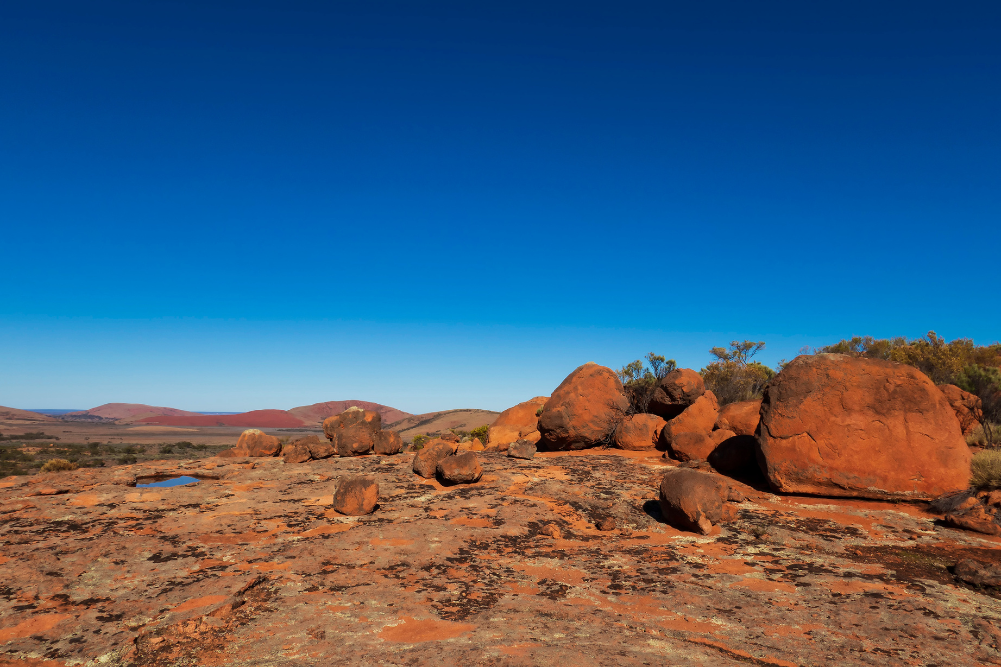Freedom from death anxiety
Our culture encourages denial about death. While we don’t talk about it, death anxiety is a pervasive theme of being human, shaping much of what we think and do. Coming to terms with our mortality can only help us.
We first become aware of death’s universality, irreversibility and inevitability between the ages of three and nine. This terrifying discovery comes to us in gradual stages, says Professor Ross Menzies, a mental health author, professor of clinical psychology at the University of Technology, Sydney and practising clinical psychologist. From then on, we live our existence under the fearful spectre of death, he says, a bitter knowledge that’s the source of much (mostly subconscious and repressed) distress.
What’s less understood is how fear of death shapes human wellbeing, behaviour and society. This revelation is the crux of a groundbreaking book, Mortals: How the Fear of Death Shaped Human Society, co-authored by Menzies and daughter Dr Rachel Menzies (also an acclaimed psychologist). Death, they write, is the “worm at the core of the human psyche, nibbling away at our sense of security”.
Professor Menzies has been treating people with anxiety-related and mood disorders for more than 30 years. They’ve become a leading expert in the field of death anxiety. “To some extent it’s present in all of us,” he says. “It’s one of the great curses of being human.”
The human curse
All biological life perishes. But humans are doubly cursed by our awareness of death. It’s our intelligence and capacity for reflective consciousness that’s to blame. It allows us to contemplate the future, where, inevitably, as the duo write in Mortals, “all paths are leading — to the grave”.
Research, their book tells, shows death is greatly feared, for many to the point of undermining enjoyment in life. Death is our biggest fear in childhood and adolescence. Mercifully, death anxiety tends to subside in the last third of life, Professor Menzies says. “One obvious reason is that the quality of life is diminishing: you’re not losing as much,” he says. “You also may have become satisfied with what you achieved in life.”
Manifesting differently in all of us, death anxiety, he says, is a complex construct, because there’s no single, defining component. “Some people with death anxiety are worried about the notion of nothingness and going to nothingness; others are worried about missing out on things they’ll never get to see. Yet others are worried about loved ones dying: all of their death anxiety is about attachment figures they don’t think they could cope without. Some are worried about the passage to death. It’s ‘what if I got incredibly sick with a terminal illness, and it was a slow and painful passage to death’. You can end up terrified of death for a multitude of reasons.”
The root of anxiety
According to Professor Menzies, death anxiety drives a lot of mental health problems. Research by Dr Rachel Menzies, and her team at The University of Sydney, suggests our terror of “the end” is related to a variety of mental health problems. This link is particularly strong with anxiety disorders, such as panic disorder, somatic symptoms related to anxiety, generalised anxiety disorder, illness anxiety (dread of disease associated with excessive doctor visits and medical checks) and obsessive-compulsive disorder. (Rachel Menzies received the Dick Thompson Thesis Prize for her work on the link between death anxiety and OCD.)
“Anxiety is a very large number of conditions that we now think of as being derivatives of death anxiety,” Professor Menzies says. Anxiety around death may indeed be the underlying cause of many phobias — such as fear of the dark, spiders, germs, heights, flying, crime and natural disasters.
A link between death anxiety and depression is less clear, however Menzies believes it’s a factor in existential-type depressions. “They’re about, you know, what’s the point of my existence? I simply work all day, crash at the end of it, get up and do it again, and then eventually go to dust,” he says.
Coping mechanisms
Throughout the ages, we’ve employed various strategies for living with the knowledge of our demise. As discussed in Mortals, these range from plain old denial and suppression to seeking immortality in various guises. Think of egoic achievements, lasting legacies, continuing our genetic line. For many, the answer is to live a grand existence.
Traditionally, religions, with their varying beliefs about the afterlife, have been a source of comfort in all cultures. “If death is the oldest thorn in our side, then religion is its oldest balm,” the Menzies write in Mortals. What most religions share is the belief in an indestructible soul and the promise of immortality in the afterlife.
Harmful consequences
On the downside, our mechanisms for coping with death’s ever-present shadow are often maladaptive, damaging to us, society and the planet. Taken to its extreme, eat, drink and be merry for tomorrow we die, for instance, can bring on ill health.
There’s experimental research showing that the desire to have lots of children relates to death anxiety, Professor Menzies reveals. “We’ve over-populated our planet in part because of the deep desire to cheat death and leave our genetic material.”
Another unhelpful way we deal with death anxiety is to live well through consumerism, which causes obvious problems for the planet, he says. “And we know that religious wars and conflicts over who’s got the right story to death, are problematic.”
Life extension or death denial?
Echoing the pharaohs of ancient Egypt, the super wealthy today collectively spend billions to avoid death, albeit in the pursuit of life extension via science.
Professor Menzies finds the obsession in various areas of science to extend life at all costs, appalling. During COVID, for example, we shut down nursing homes and prevented the dying elderly from seeing their loved ones. “We put a greater price on getting that 93-year-old to 94 than we did on the quality of their life,” he says.
“It does seem strange that we can now keep people alive for a very long time, often in appalling circumstances where they’re demented, they may be blind and deaf. We’re obsessed in a way that doesn’t suggest acceptance of death in our culture.”
Radical acceptance
“In Mortals, we argue that of all the schools of thought over the last few thousand years, the group that were probably closest to giving us a solution were the stoics,” Professor Menzies says. “The stoics taught that desiring anything beyond your control is a recipe for anxiety. The principle of desire in stoicism is a simple one: if I only desire the things within my control, I won’t be anxious. If I desire a cup of tea, I won’t be anxious, but if I desire to see my children get to maturity, I’ll be anxious, because can’t make it happen. The Stoics encourage radical death acceptance. Humans need to accept their mortality and accept that death can come at any minute, and not rail against it so much.” It’s being accepting of whatever happens.
Healthy balance
Accepting death doesn’t mean we shouldn’t look after our health, but it’s doing so within the understanding that we can’t control our passing. “To be frank,” Professor Menzies says, “there’s not many things a person can do to stay healthy”. Research shows longevity is linked to balance in only a few things: moderate exercise, sleep, good diet, healthy weight and eliminating lifestyle factors known to contribute to early mortality.
“What goes wrong for humans is they start doing other things that are unnecessary,” he says. “Scrubbing their skin or checking the gas stove is off 50 times, or overly using the health system by checking the same symptoms three times in four weeks.”
Living better
It would be better if they were enjoying the moments they had,” he says. “Watching the movies, eating the pasta, listening to the music and just enjoying the fact that they got to experience existence, rather than railing against, you know, how long have I got in the theme park? We need people to get to the idea that that’s a bit of a boring question. Does it really matter if I live 727,000 hours or 762,000 hours? Surely what matters is how I lived during it.”
Embracing the reality of death helps us use our living time more wisely. In this sense, death can be a shrewd ally and counsel.
Death exposure
One of the most important principles in beating anxiety is confronting our fears, Professor Menzies adds. “We’ve known that for hundreds of years. You know, if someone’s afraid of dogs, you get them a puppy.” He says more collectivist societies deal better with death. In most modern Western societies, we’ve hidden death away and avoid contact with it as much as we can. “We used to live in villages, there’d be local graveyards and you might walk past many of your relatives on a daily basis,” he says. “Now, we put them in places like [western Sydney cemetery] Rookwood with a million people interred, but no one’s passing there. Now, the elderly don’t tend to live with us, so we don’t tend to see death in our homes. We put them off into nursing homes, palliative care units and so on. The majority of Australians wish to die in their homes. The majority do not get to, because we’ve medicalised the end of life. Even when people are dying with terminal illnesses, often nobody is talking to them about death, everyone’s avoiding the topic. It’s very strange.”
Talk about it
Professor Menzies encourages us to explore and talk openly about death. Benefits include helping us release our terror, plan better for our end, prepare others and die better. Talk about the sort of funeral you’d want, he suggests. Encourage your family and others to talk about death. “There’s this sort of death conversation that the positive death movement, which is trying to encourage a more positive attitude to the end of life, really emphasises.”
He thinks Death Cafes — an international movement where strangers gather to talk about death over coffee and cake — are great. Other opportunities for talking and thinking constructively about death include with death doulas, spiritualists, palliative care organisations and watching documentaries and movies on the topic.
Spiritual philosophies and practices
Philosophies and practices that encourage mindfulness, living in the now and embracing impermanence can help neutralise fear of our future demise. A study published in Mindfulness, in 2022, found both mindfulness and contemplative practices (visualising Mother Nature and encouraging a positive inner state) effective in reducing fear of death.
Does religion help? A study of data on 26,000 people worldwide, published in Religion, Brain & Behavior, found the most religious people and atheists tended to fear death the least. Shedding light on the paradox, a small, qualitative study, published in The Journal of Religion, Spirituality and Ageing, discovered those with a “loose” or “lost” religion expressed more fear of dying than participants with a lacking, lasting, liminal, learned (informed by academia) or liquid (blended spirituality) religion. A British YouGov study, also looking at this question, found non-practising religious people somewhat more likely to fear death than those practising their religion. Perhaps, inconsistency between our beliefs and behaviours increases death anxiety. Or we fear punishment in the afterlife.
Many have found hope in the millions of near-death experiences catalogued by medical professionals around the world. Experiencers generally cease to fear death.
What’s certain: hope makes our suffering more bearable. Death is a mystery and no small matter. We should not be shamed by our fear of it.








